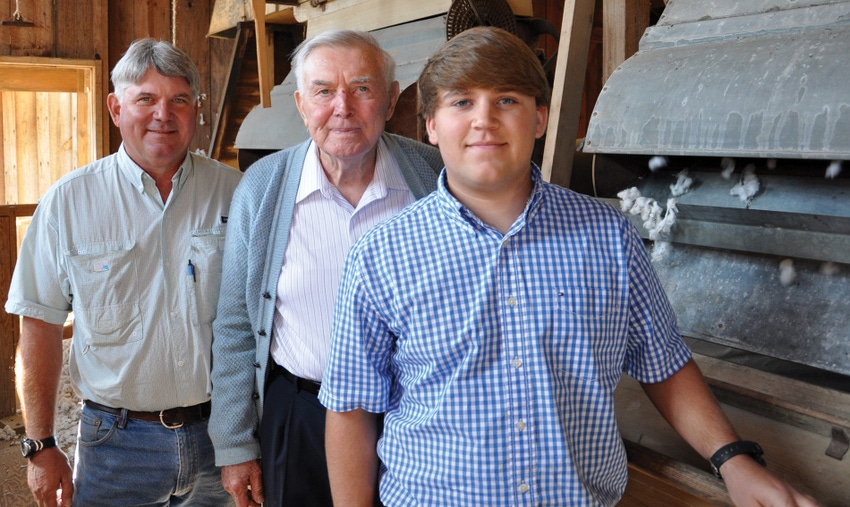
Very young mechanic restores very old picker
Thomas Hairston is a 16 year old junior at Humpreys Academy in Belzoni, Miss., who restores old equipment as a hobby. His latest restoration is a one-row cotton picker built in 1958.It took Thomas over a year to restore the cotton picker to working condition. Recently he donated some cotton picked with the unit the Bisland Gin, the oldest operating cotton gin in America.

If you ask 16-year-old Thomas Hairston why he fixes up old farm equipment, he’ll say he just enjoys working on old stuff. As far as enjoying the history behind these artifacts – not so much.
“I really don’t like history that much,” said Thomas, with a hint of a smile.
Then again, maybe Thomas, a junior at Humphreys Academy, in Belzoni, Miss., is the kind of person that needs to see, touch and get his hands on a history lesson to fully appreciate it. Like the year and a half he spent restoring an old, John Deere, one-row cotton picker.
The picker is one of the earliest designs of mechanical harvest, noted Bobby Skeen, Mid-South regional communication manager for Cotton Incorporated, who went to the Hairston farm to see Thomas operate the harvester. “The picker head was mounted on the back of the tractor, and the tractor was operated in reverse through the field to harvest the cotton. The picking unit was built in about 1958.”
Thomas became interested in one-row cotton pickers after discussing the subject with his father, Robert, a Silver City, Miss., cotton producer and partner in Midnight Gin, in Midnight, Miss. After almost of a year of searching, Thomas found one in Arkansas from a dealer who was downsizing his collection. What he’d found was a Model 60 John Deere tractor with the picking machine mounted on top of it. He paid a little over $5,000 for the picker and another $600 to have it delivered, with his own money.
“The unit ran,” Thomas said. “But it didn’t run very well,” perhaps owing to a chunk of wood that tore through the unit while a previous owner had it.
It took Thomas a year and a half, but he restored the old relic to working condition. He’s operated the picker on three occasions so far, but is still a little reluctant to really put it through the paces. It doesn’t pick as clean as he would like, but “it’s good enough.”
The picker basket holds about 1,100 pounds of seed cotton. It unloads to the left, with cotton gravity-flowing from the basket after it’s tilted.
Thomas recently donated three basket loads of cotton he picked with the one-row picker to the Bisland Gin, the oldest operating gin in America. The 1892 gin is located at the Mississippi Agriculture and Forestry Museum in Jackson, Miss., and is run once a year during the museum’s fall festival.
Thomas, along with his grandfather, Peter, a former business manager at Midnight Gin, Midnight, Miss., Thomas’ father, Robert, a current board member at Midnight Gin, and Midnight Gin Co., ginner Robert Royal, were also on hand to watch Thomas’ cotton run through the gin in November.
During a break between runs, Thomas described his love of old equipment. “I’ve grown up around the farm, and I’ve always been interested in old equipment. The older equipment is a lot simpler. You don’t have metric wrenches and all of that mess to worry about. The new equipment is much more complex, but I do work on the more modern equipment too.”
Thomas’ aptitude for mechanics doesn’t surprise his father. But his persistence does.
“I figured his interest would peter out, but it hasn’t,” Robert said. “He’d be out there to as late as nine or 10 o’clock at night working on it. He’s got the patience, but you have to get used to him overhauling the carburetor on the coffee table. He’s always been like that though. The weedeater would break and he would tear it apart.”
If you haven’t guessed by now, engineering skills run in the family. Before Robert became a cotton producer, he was an engineer for Schlumberger, working in the oil fields in the Gulf. His oldest son is now a mechanical engineer, working for Haliburton on an offshore oil rig in the Gulf. Another son is working on an agricultural engineering degree at Mississippi State University.
Thomas hasn’t decided what he wants to do after graduating from high school, whether that’s to pursue an engineering degree and career, or get a degree and return to the farm. His father isn’t pushing him in any direction.
“He can be on the farm, but he can be a mechanical engineer as well,” Robert said. “Whatever path he chooses is up to him.”
It’s a common refrain on farm families these days – owner operators not wanting to push their children too hard into agricultural careers because farming has become so risky. Cotton margins are really getting thin, one reason why the Hairstons will cut back significantly on cotton in 2013. “We have to have lower input costs, or we have to have higher prices on what we’re selling,” Robert said. “You can’t beat the economics of going to grain.”
Hopefully, there’ll still be enough acreage for Thomas to make a couple of runs with his one-row picker.
About the Author(s)
You May Also Like





